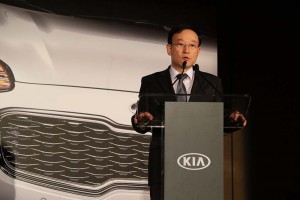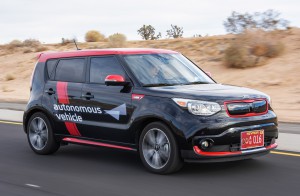
Kia EVP Seung Ho-Hwang outlined the automakers plans for autonomous vehicles at the Consumer Electronics Show.
Kia has become the latest automaker to lay out plans for introducing autonomous vehicles to its line-up, though the maker is taking a more cautious approach than some of the leaders in the field.
During a news conference at the Consumer Electronics Show in Las Vegas, officials from the Korean carmaker said they will offer their first “partially autonomous” vehicle by 2020, with “highly autonomous” technology to follow five years later. Vehicles capable of driving under all conditions hands-free, even without a driver at all, would follow in 2030.
“Kia will invest up to $2 billion in developing these new technologies,” said Seung Ho-Hwang, the Kia executive vice president overseeing the autonomous vehicle program.
The EVP noted that Kia is already developing advanced driver assistance systems, including automatic emergency braking and Smart Parking Assist, for its current line-up. But it has a ways to go before it can allow motorists to take their hands off the wheel, at least in select situations such as limited access highways.
(Kia makes big splash with little 2017 Sportage. For more, Click Here.)
Kia isn’t the only maker taking a phased-in approach. Tesla just launched its AutoPilot, which allows hands-free highway driving. Cadillac and Nissan plan to roll out similar systems in the next few years, though Nissan has announced one of the most aggressive efforts to get to full autonomy. It promises to have its first model in production by 2020.
Not everyone is so optimistic. At a separate CES briefing, Gill Pratt, the head of the new Toyota Research Institute, a $1 billion effort aimed at autonomous driving and other mobility systems, said it is simply too early to say when autonomous vehicles will be ready for the retail market.
Kia appears to be taking the middle ground as it develops what it calls its Drive Wise system.
The Korean carmaker is already field testing some early prototypes, including modified versions of the popular Kia Soul crossover vehicle. Kia recently received a license from the State of Nevada permitting testing on public roads. It is planning to receive similar approval for testing elsewhere, including its home market.
(Click Here for details about Ford’s mobility plans.)
Numerous hurdles remain before Kia, or its rivals, can go to production. There are plenty of technical issues. It will require developing robust systems that can operate on more than just well-marked roads in ideal weather conditions.
There are cybersecurity issues, noted Henry Bzieh, head of Kia’s infotainment technology unit.
And there are legal and regulatory hurdles. Only a handful of states have yet passed regulations covering autonomous vehicles. And new draft rules from California would bar completely driverless vehicles.
But there is growing momentum to work through such obstacles, federal regulators among those seeing great potential for autonomous technology. Some proponents believe self-driving cars could all but eliminate highway crashes considering research show 95% of all accidents are the result of human error.
(To see how automakers are turning CES into a high-tech auto show, Click Here.)
As to how Kia would roll out its Drive Wise technology, Bzieh said the plan is to “cover all of our products … from the most premium to the C-segment vehicles.”

